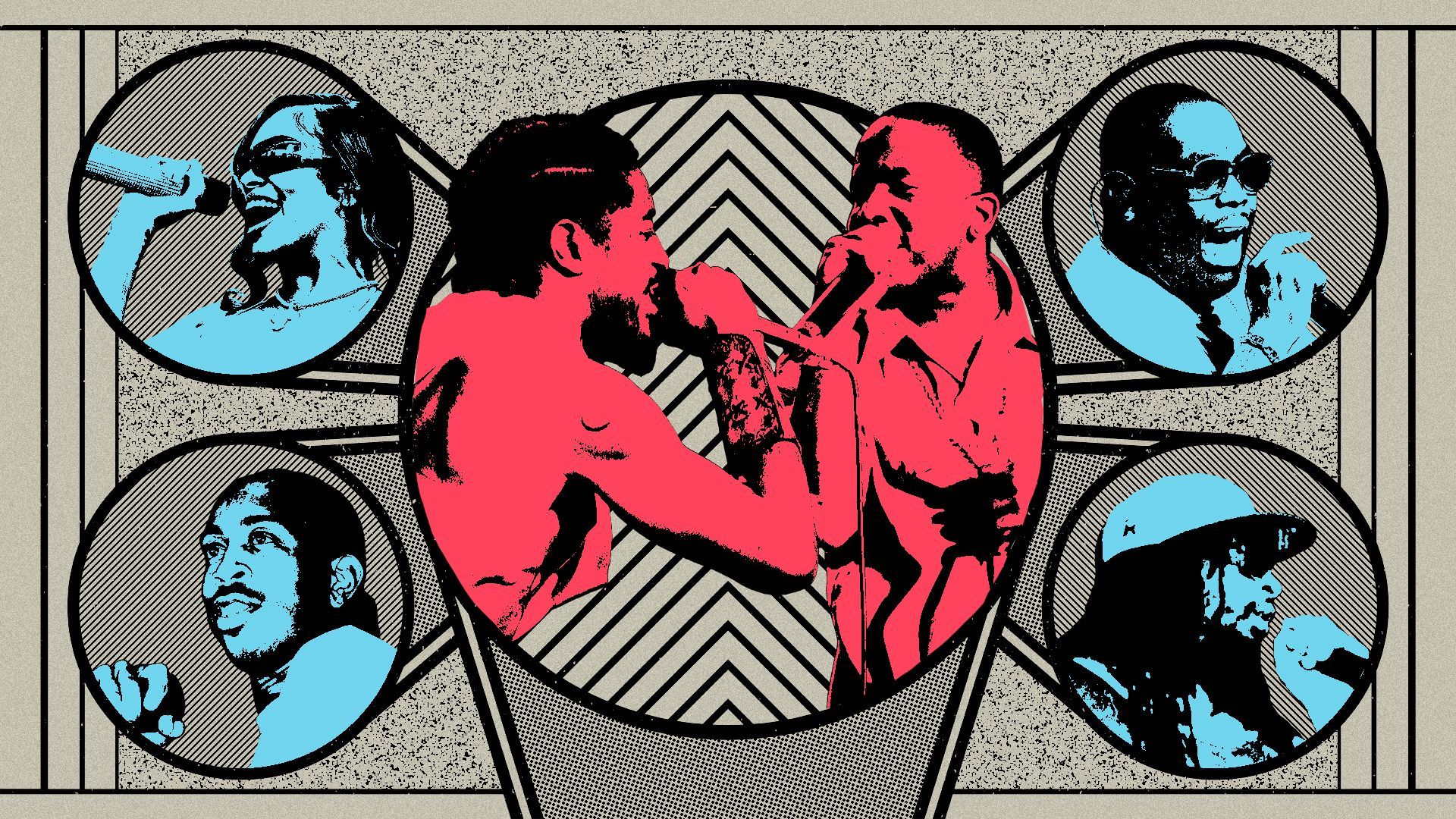Atlanta center stage as world marks 50 years of hip-hop

- Kristal Dixon, author ofAxios Atlanta

Photo illustration: Brendan Lynch/Axios. Photos: Rick Kern, Tim Mosenfelder, Peter G. Forest, and Lawrence Lucier/Getty Images
It's been 28 years since André 3000 of Outkast proclaimed at the 1995 Source Awards that "the South got something to say," and the region's message has been heard loud and clear across the world.
Driving the news: Hip-hop celebrates 50 years this weekend, and the South's — specifically Atlanta's — role in the genre remains at the center of conversations about its history and future.
Why it matters: Andre's declaration "kicked the door open for these different sounds, these different experiences that happen within Southern hip-hop," Regina N. Bradley, an English professor at Kennesaw State University and author of "Chronicling Stankonia: The Rise of The Hip-Hop South," told Axios.
- "Atlanta plays such a significant role because we contribute to a lot of the sub-genres in Southern hip-hop, from crunk to trap to snap, even our own form of conscious rap," she said. "It separates us from the pack."
Atlanta is the hip-hop capital of the South, but its sound is not monolithic, said Greg Street, a long-time DJ and radio host on Audacy's V-103.
- "The artists here are really true artists, and they just do what they do," he told Axios. "And people in the city like what they do."
Flashback: Atlanta has always been a city with its own music scene, Bradley told Axios. One group popular during the 1970s, Atlanta-based Brick, saw success with its unique blend of funk and jazz.
- After establishing her own marketing and public relations firm in the 1970s, Bunnie Jackson Ransom, the former wife of former Mayor Maynard Jackson Jr., founded Atlanta Artists Management in the 1980s and managed The S.O.S. Band, Cameo and musicians, according to Capital B Atlanta.
- Funk influence is also heard in the music produced in the early 1990s by Organized Noize, made up of Sleepy Brown (the son of Jimmy Brown, a co-founder of Brick), Rico Wade and Ray Murray, Bradley added.
- "You have Organized Noize introducing an Atlanta sound, but also introducing the city of Atlanta as a hip-hop city," she said.
Before coming to Atlanta, Street was a DJ in Dallas where he introduced Outkast to the audience at a show at The Bomb Factory in 1994. Once he relocated to Atlanta, Street said he began playing songs by Outkast and other local artists like Kilo Ali, Goodie Mob and Ghetto Mafia.
- Listeners began requesting those songs "because you were hearing the artists from your neighborhood on the radio," Street told Axios.
The intrigue: Hip-hop is a male-dominated industry, but many of its unsung heroes are women, Bradley said.
- Rappers like Rasheeda, Miss B and some of the younger artists like Latto, Baby Tate and LightSkinKeisha are holding their own, but are not at the forefront of people's conversations.
While some of that can be contributed to misogyny, Bradley said it's more complicated than that.
- At one point, a variety of emcees like Lady of Rage and Queen Latifah were popular, but then the "Little Kim effect" happened, and female rappers were expected to be hypersexualized, Bradley said.
Yes, but: Several female rappers from Atlanta, including Princess and Diamond from Crime Mob, refused to put themselves in that box, however.
- "We don't have the language to articulate what women can contribute outside of these expected norms about gender and hip-hop," she said.
State of play: Street told Axios that female rap artists from the South, such as GloRilla (Memphis), Megan Thee Stallion (Houston) and City Girls (Miami), have become popular over the last several years.
- "People just don't really pay attention to them and give them their credit," he said.
The bottom line: Atlanta will remain relevant in the hip-hop industry because it's a music destination, Street told Axios.
- Along with being home to some of the biggest hip-hop artists, Street said Atlanta is also home to producers and songwriters behind some of the biggest pop records to date.
- Atlanta is "too ingrained in the system" for the city to lose its influence, but Bradley said she hopes the way Southern hip-hop is documented and represented includes more women, more queer people, and more people outside of New York.
- "We need to honor and celebrate those differences," she said. "Hip-hop didn't hit us all the same way."